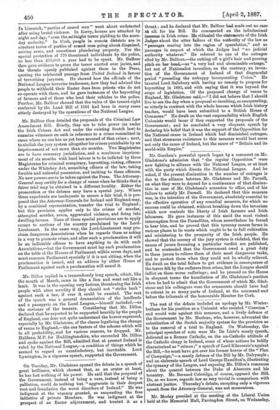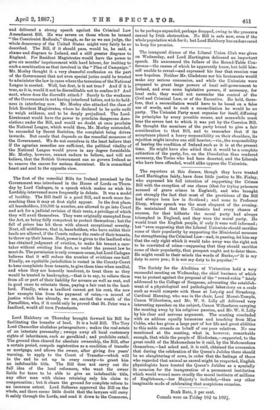Mr. Morley presided at the meeting of the Liberal Union
held at the Memorial Hall, Farringdon Street, on Wednesday,
and delivered a strong speech against the Criminal Law Amendment Bill. He was severe on those whom he termed -" the Coercionist Radicals," though, so far as we can judge, the -whole democracy of the United States might very fairly be so 'described. The Bill, if it should pass, would be, he said, a shame and disgrace to Ireland, and a still greater disgrace to England. For Resident Magistrates would have the power to give six months' imprisonment with hard labour, for inciting to such a combination as that involved in the "Plan of Campaign." Sir. Morley thought it a very shameful confession on the part -of the Government that not even special juries could be trusted to administer the law in cases where the terrorism of the National League is exerted. Well, but first, is it not true P And if it is true, as it is, would it not be discreditable not to confess it P And next, where does the discredit attach P Sorely to the weakness -of the Government in not having interfered before, not to its bold- ness in interfering now. Mr. Morley also attacked the class of Irish Resident Magistrates, whom he declared to be quite unfit -to weigh evidence, and to be deeply prejudiced. The Lord- Lieutenant would have the power to proclaim dangerous Asso- c iations under the Bill, and would no doubt at once proclaim the National League, which would then, Mr. Morley contended, he succeeded by Secret Societies, the complaint being driven inwards. But surely that depends on the remedial measures of the Government. We do not ourselves in the least believe that if the agrarian remedies are sufficient, the political vitality of the National League would prove in any degree formidable. Mr. Morley, however, cannot endure to believe, and will not believe, that the British Government can so govern Ireland as to remove the causes for serious discontent. He is committed -heart and soul to the opposite view.



































 Previous page
Previous page